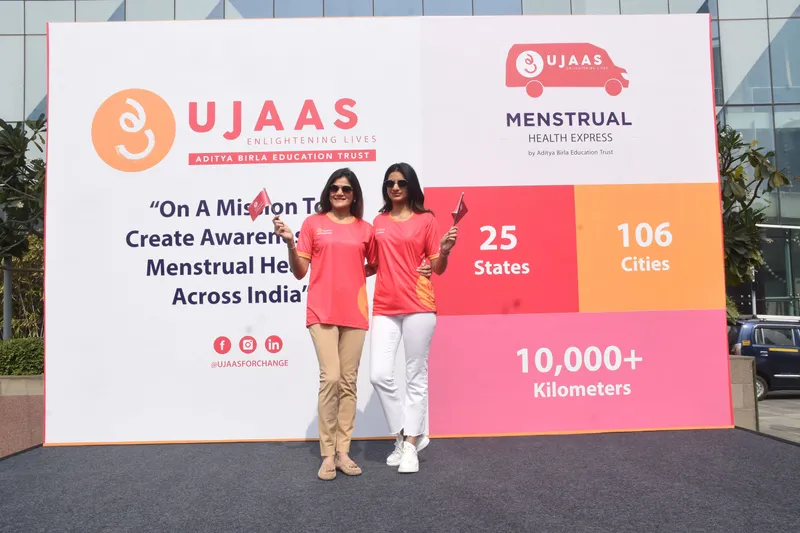Ujaas’ Menstrual Health Express to drive awareness in 106 cities in 25 states
Advaitesha Birla, Founder of Ujaas, a menstrual health non-profit, talks to SocialStory on the launch of the Ujaas Menstrual Health Express, a van that will travel to 106 cities in 25 states to drive awareness on menstrual health and gain relevant insights and information.
In 2021, Advaitesha Birla, the youngest daughter of Kumar Mangalam and Neerja Birla, started , a non-profit initiative for menstrual health under the Aditya Birla Education Trust.
Eighteen years old at the time, Birla’s idea behind starting was to bring a sustainable change in menstrual health and hygiene management by bringing more awareness at the grassroots level.

Advaitesha Birla (right) with her mother Neerja Birla at the flag off event
With a focus on collaborative efforts on breaking down taboos and stereotypes, and challenging the societal stigma associated with menstruation, Ujaas has so far touched the lives of 205,463 beneficiaries, and distributed over 2,575,348 sanitary pads, reaching out to 17 locations across Maharashtra.
This month, in an effort to take the initiative pan-India, Ujaas flagged off the Ujaas Menstrual Health Express, an awareness van that will travel through 25 states and 106 cities, covering over 10,000+ kilometres by road. Partnering with local NGOs, it will drive awareness and gain insights into varied cultures, practices, and beliefs surrounding menstruation and menstrual health and hygiene in different states.
Making sure every girl has the right information
Speaking to SocialStory on the initiative, Birla says, “Our aim of starting Ujaas was to drive conversations and work in the space of menstrual health, which means creating awareness and making sure every girl has the right information and means to lead a healthy life when it comes to her periods.”
The idea, she adds, is to expand into pan-Indian territory and convert this into a moment.
“We want to gather a lot of information and insights as it varies throughout the country. This will be valuable information we can use to back future initiative and efforts.”
Birla points out that the work of Ujaas in the past three years has yielded some tangible information about menstrual health at the grassroots level. But still, awareness remains important.
“A lot of girls don’t know what menstruation is until they get their first period, and this can be both scary and intimidating. A lot of parents are also not equipped to handle their questions in the right manner and do not have the right resources,” she says.
This lack of awareness is heightened in the rural areas, and Birla says stigma still plays a huge role in misinformation and prevalence of myths.
The Ujaas Menstrual Health Express travels with a team that works with NGOs on ground
for different activities.
Birla outlines how it’s done.
“On arrival at a particular destination, the first step the team undertakes is a distribution drive of reusable sanitary napkins. Secondly, we are also organising baseline inline surveys to gather information on practices in the area. After that is the awareness session in the form of talks and street plays. The more people are engaged—young girls, boys, mothers, fathers—the more interested they become in the topic,” she says.
The journey so far
The Ujaas Menstrual Health Express van has so far travelled to Mumbai and Raigad in Maharashtra; Arambol, Pernem, Querim in Goa; Bengaluru, Davangere, and Hosapete in Karnataka; and Wayanad and Kozhikode in Kerala.
“From these two places, we have discerned that among fifth to seventh students, only 28% of girls know about periods, only 39% girls were aware that periods happened monthly and last for a minimum of four days based on individual period cycles. Also, only 36% girls agreed that menstruation is a natural process and a whopping 89% girls felt that a girl/woman is impure if she is menstruating,” she says.
However, the analysis was different among eighth to tenth grade students where 85% girls believed menstruation is a natural process, 93% girls could answer how many days one approximately menstruates and it happens every month, and 45% girls felt that a woman/girl is impure if she is menstruating.
Rutuja Patil, a class X student from Raigad says, “We had a good awareness session that helped me understand my periods better. We don’t talk about periods with our friends and family members. When I got my first period, my mother told me all girls get it and I should not enter the kitchen during the kitchen during those days. She didn’t explain much to me. The information I got through the Ujaas workshop has cleared a lot of my doubts.”
The team also believes it’s early days and over the course of the van’s travels, and with collation of more data, it will be able to get a clear picture and differentiation on the level of awareness in different cities and towns.
The initiative goes beyond mere awareness efforts, and incorporates the distribution of free sanitary napkins. A significant portion of these distributed napkins will be manufactured by Ujaas itself, in collaboration with self-help groups.
Through this collaboration, more than 25 women have received specialised training for sustainable cloth napkin production, not only contributing to the campaign's objectives but also enhancing their livelihoods. In total, over 250,000 pads will be distributed as part of this campaign. Ujaas is also opening an exclusive sanitary-pad making unit in Jalna in Maharashtra to manufacture reusable cloth pads.
Birla, who is currently an undergraduate student of psychology and education in the UK, plans to join the van towards the latter half of the campaign.
“This campaign is not merely a one-time intervention with beneficiaries. We will continuously engage with them so that we can see the change on ground,” she says, as she signs off.
Edited by Megha Reddy






